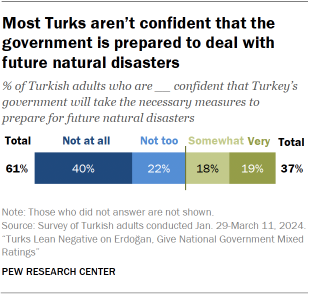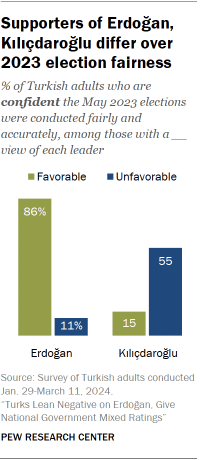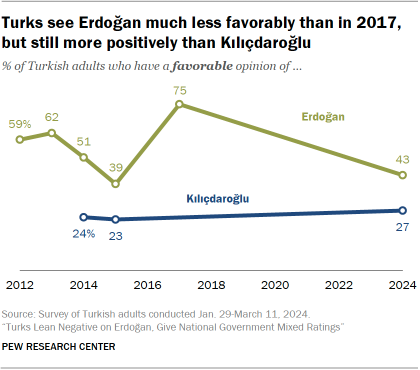Turkish adults are divided when it comes to trust in their national government: 46% trust the government to do what is right for the country, while 51% do not.
Trust is especially high among those who have a favorable opinion of President Recep Tayyip Erdoğan. The president’s supporters are nearly five times as likely as nonsupporters to have trust in the national government (84% vs. 17%).
Age also plays a role in views of the government. Turkish adults under 35 are less likely than older adults to express trust in the government.
Trust in the government is significantly higher among Muslims who pray salah – the ritual prayers required of Muslims five times a day – when compared with those who pray less often. About seven-in-ten Muslims who pray five salah daily (69%) say that they trust the national government to do what is right. This compares with 40% of Muslims who pray at least weekly (but not five times daily) and 26% of those who pray less than weekly. (The Center uses frequency of prayer as a measure of religiosity.)
Education is another key factor. While 52% of Turkish adults with a secondary education trust the government, this falls to just 26% among those who have a postsecondary education or more.
Preparedness for natural disasters

In this survey – conducted roughly one year after a 7.8 magnitude earthquake struck Turkey and Syria, leaving more than 50,000 dead – we asked Turks how confident they are that the government will take the necessary measures to prepare for future natural disasters.
About six-in-ten Turks (61%) are not confident the government will do this, including 40% who say they are not confident at all.
Views on this question differ widely depending on how respondents see Erdoğan. Three-quarters of Turks with a favorable opinion of Erdoğan have confidence that the government will take steps to be prepared for a future natural disaster. Only 9% of those with an unfavorable opinion of Erdoğan agree.
May 2023 election fairness

In a May 2023 national election, Erdoğan faced off against Kemal Kılıçdaroğlu, then the leader of the opposition Republican People’s Party (CHP). Erdoğan won in a runoff with 52% of the vote.
Beginning the following January, we asked Turkish adults if they believe the election was conducted fairly and accurately. Overall, 53% of Turks do not think the election was fair, but this opinion varies widely depending on how favorable they are toward each candidate. Among Turks with a favorable opinion of Erdoğan, 86% are confident the election was conducted fairly and accurately. Just 15% of those with a favorable view of Kılıçdaroğlu agree.
Confidence in the election is also higher among Turks ages 50 and older than those under 35. About half of the older group (52%) are confident that the election was fair, compared with about a third of the younger group (34%).
Among Turkish Muslims, 70% of those who pray five salah daily are confident in the fairness of the election, including 46% who are very confident. Much smaller shares of those who pray less frequently agree.
Favorability of Erdoğan and Kılıçdaroğlu over time

In our surveys, Erdoğan has consistently received higher favorability ratings than Kılıçdaroğlu. Still, Erdoğan’s favorability is down 32 points from 2017; that year’s survey was conducted eight months after a coup attempt against his government. Today, 43% of Turks see Erdoğan favorably.
Kılıçdaroğlu’s favorability, by comparison, is similar to where it was when we last asked about him in 2015. Today, 27% view him favorably, compared with 23% in 2015. (It’s important to note that the most recent survey was fielded after Kılıçdaroğlu was replaced as leader of the Republican People’s Party.)
People ages 35 and older, adults with less education and Muslims who pray more frequently hold more favorable opinions of Erdoğan than their demographic counterparts. Kılıçdaroğlu, who is an Alevi Muslim, is seen more favorably by Turkish Muslims who pray less than once a week than by those who pray five salah daily.
About one-third of Turkish adults have a negative opinion of both Erdoğan and Kılıçdaroğlu. Similar to demographic patterns on trust in government, these people are more likely to be young (adults under 35), to have at least a college degree and to pray salah five times a day, if Muslim.
